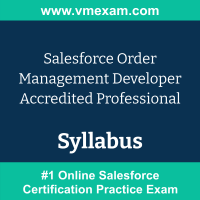 The Salesforce Order Management Developer exam preparation guide is designed to provide candidates with necessary information about the Order Management Developer exam. It includes exam summary, sample questions, practice test, objectives and ways to interpret the exam objectives to enable candidates to assess the types of questions-answers that may be asked during the Salesforce Order Management Developer Accredited Professional exam.
The Salesforce Order Management Developer exam preparation guide is designed to provide candidates with necessary information about the Order Management Developer exam. It includes exam summary, sample questions, practice test, objectives and ways to interpret the exam objectives to enable candidates to assess the types of questions-answers that may be asked during the Salesforce Order Management Developer Accredited Professional exam.
It is recommended for all the candidates to refer the Order Management Developer objectives and sample questions provided in this preparation guide. The Salesforce Order Management Developer certification is mainly targeted to the candidates who want to build their career in Salesforce Accredited Professional domain and demonstrate their expertise. We suggest you to use practice exam listed in this cert guide to get used to with exam environment and identify the knowledge areas where you need more work prior to taking the actual Salesforce Order Management Developer Accredited Professional exam.
Salesforce Order Management Developer Exam Summary:
|
Exam Name
|
Salesforce Order Management Developer Accredited Professional |
| Exam Code | Order Management Developer |
| Exam Price |
Registration fee: USD 150 Retake fee: USD 150 |
| Duration | 90 minutes |
| Number of Questions | 60 |
| Passing Score | 70% |
| Recommended Training / Books |
Order Management Foundations for Developers Get to Know Order Management for Developers |
| Schedule Exam | Kryterion Webassessor |
| Sample Questions | Salesforce Order Management Developer Sample Questions |
| Recommended Practice | Salesforce Order Management Developer Accredited Professional Practice Test |
Salesforce Order Management Developer Syllabus:
| Section | Objectives | Weight |
|---|---|---|
| Data Management |
- Demonstrate in-depth knowledge of the data model, import and export data, create historical data loads converting them to Order Summary Objects, implement real-time calls using APIs. - Explain the entity relationship diagram and hierarchical object graph along with the reasoning behind it. Import and export data with tools like Data Loader, Command Line Interface (CLI) and Apex Scripts. - Use attribution, flows, custom objects and batchable Apex to create historical Order data loads. - Convert Order objects to Order Summary Objects (either managed or unmanaged). - Implement real-time object creation using the Composite and Composite Graph APIs. |
17% |
| Order Management Domain Knowledge |
- Map the system landscape and prioritize integrations according to those providing the most business value and propose new integrations according to the customer's overall order management vision. - Map the system landscape completely, accounting for the timing of all existing and proposed integrations. - Bifurcate proposed integrations into those providing the most and least amount of business value realization according to existing customer's business requirements plus those mapping to the overall Order Management vision. |
17% |
| Platform Integration |
- Integrate Order Management with B2C Commerce or B2B Commerce and activate Omnichannel Inventory features while using platform features for low-code and immediate value-add solutions when integrating with third party systems. - Use existing processes to integrate Order Management with B2C Commerce, B2B Commerce or activate Omnichannel Inventory. - Leverage existing platform features such as Triggers, Platform Events and Push Notifications for low-code and immediate value-add solutions when integrating with third party systems. |
13% |
| Platform Development |
- Implement integrations typical of the order management domain like Invoices and Payment Tokens and create Actions usable in either Flows or code while advising customers on testing strategies. - Implement real-world integrations typical of the order management domain like Invoices and Payment Tokens. - Implement Apex Actions with backing Apex which are fungible in Flows and Apex and also callable from Lightning Web Components. - Advise customers on testing strategy and performance testing considerations. |
23% |
| Data Reference Implementations & Frameworks |
- Be familiar with non-product frameworks and tooling to catalyze additional customizations around enriched B2C-OMS use cases, historical data import and Customer record resolution across clouds. - Suggest non-product frameworks such as the Self-Service Cartridge, Mainstreet to Salesforce Order Management Import Framework and B2C CRM Sync. Be familiar with the basic capabilities of each and what they can offer to catalyze additional customizations around enriched B2C-OMS use cases, Historical data import of Mainstreet data and support for Customer record resolution across clouds. |
10% |
| Omnichannel Inventory |
- Position Omnichannel Inventory (OCI) with the customer and configure it with regard to both Order Management and B2C Commerce. - Position Omnichannel Inventory (OCI) as a value-add proposition for the customer. - Work with the headless APIs and integrate OCI with relation to both Order Management and B2C Commerce with close regard to the system landscape and all relevant integrations. |
13% |
| Advanced Use Cases |
- Create implementations that support real-world business requirements beyond the most typical requirements. - Implement advanced functionality like remorse periods, fraud detection, bulk orders and other more customized use cases to support real-world business requirements. |
7% |
